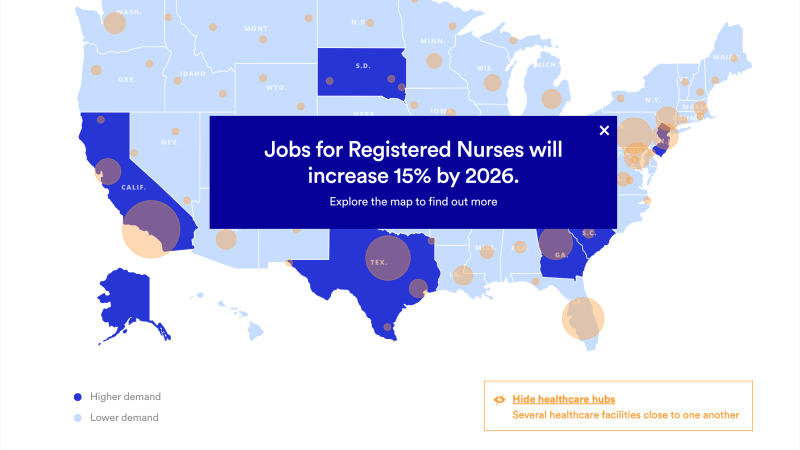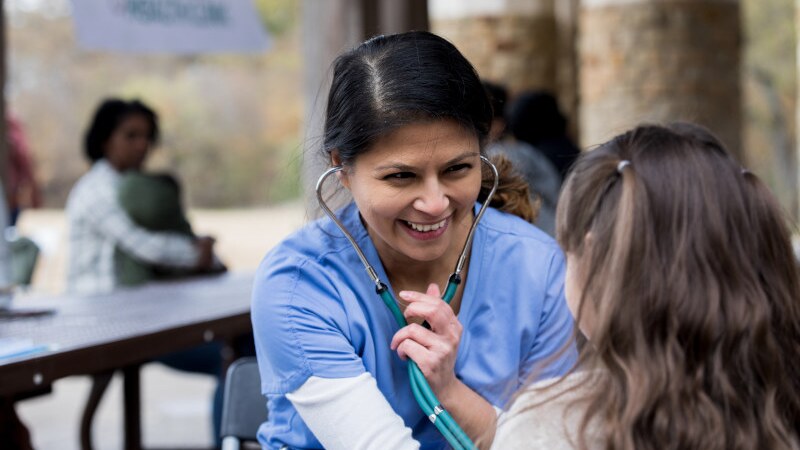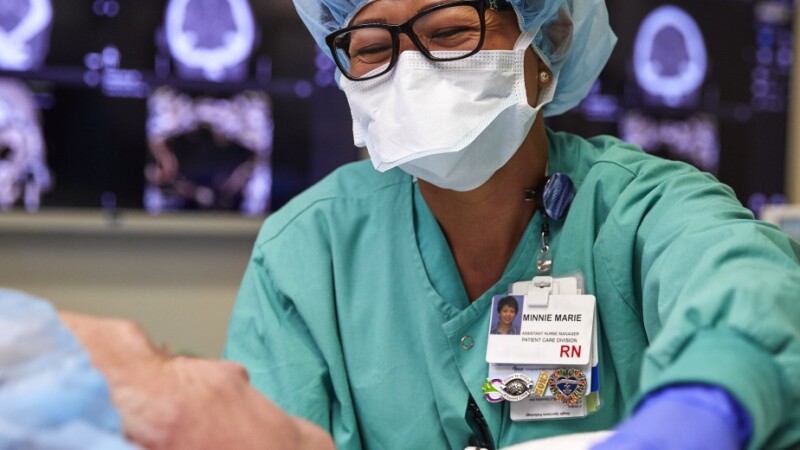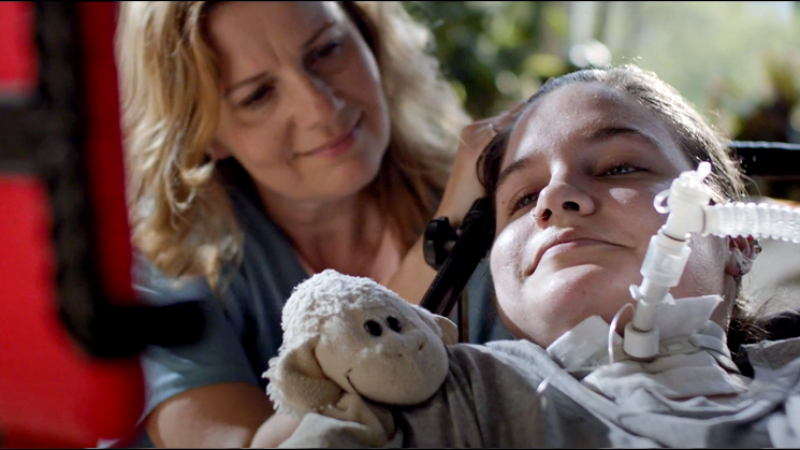Continue Your Education with a BSN
Many individuals enter the nursing profession driven by a desire to help others. As they gain experience, many seek to advance their careers to provide a higher level of care and to access new opportunities. But how can nurses move up the professional ladder, and what benefits come with pursuing advanced education in the field?
Exploring the Hierarchy of Nursing Careers
The nursing profession is structured across several levels, each with its own responsibilities, requirements, and opportunities.
– Licensed Practical Nurses (LPNs) are responsible for basic patient care tasks, often under the supervision of registered nurses (RNs) or doctors. While their role is crucial, it is limited in scope, and they typically work in supportive roles.
– Registered Nurses (RNs) hold an Associate Degree in Nursing (ADN) and must pass a licensing exam to practice. RNs are responsible for direct patient care, coordinating treatments, and providing emotional support. Due to the increasing complexity of healthcare, many medical facilities now require nurses to have a Bachelor of Science in Nursing (BSN) to stay competitive in the job market.
– Nurse Practitioners (NPs) hold advanced degrees, such as a Master of Science in Nursing (MSN) or Doctor of Nursing Practice (DNP). NPs are licensed to diagnose and treat patients, prescribe medications, and in many states, they can operate independently, without physician supervision. Becoming an NP requires passing a national certification exam and meeting specific state regulations.
The Value of a Bachelor of Science in Nursing (BSN)
Nurses may wonder if investing in a BSN is worth it, especially when there is a shortage of healthcare workers. While it’s true that many nurses can find work with an ADN, obtaining a BSN opens the door to a wider range of career opportunities. Nurses with a BSN are often considered for leadership roles, such as charge nurses, nurse managers, or clinical educators, which are not typically available to those with only an ADN.
Moreover, nurses with a BSN tend to earn higher salaries, as they are qualified for more specialized positions. Many hospitals and healthcare systems now require nurses to obtain a BSN within a certain time frame as part of their employment policies.
Key Strategies for Advancing Your Nursing Career
Beyond formal education, nurses can advance their careers through several other strategies.
1. Lifelong Learning: The Importance of Continuing Education
As healthcare evolves, staying current with new techniques, technologies, and treatment protocols is crucial. Nurses can pursue ongoing education through professional development seminars, online courses, and graduate school programs. These opportunities allow nurses to deepen their expertise and remain competitive in their field.
2. The Power of Mentorship in Nursing
Mentoring can be an invaluable tool for professional growth. Experienced nurses can provide guidance to less-experienced colleagues, offering advice on career development, work-life balance, and navigating challenges like burnout. A mentor can help a nurse explore different specialties, evaluate career options, and offer insights based on their own journey in the field.
3. Networking and Growth: The Benefits of Professional Conferences
Nurses should take advantage of professional conferences, which provide opportunities for networking, learning, and growth. These events often offer continuing education sessions and workshops while fostering connections with other healthcare professionals. Conferences also serve as great venues for finding mentors or collaborators who can support a nurse’s career advancement.
4. Strengthening Your Career Through Nursing Associations
Becoming a member of professional nursing associations can provide access to valuable resources, including job listings, professional development programs, and advocacy efforts. Many associations offer members discounts on educational materials, certification programs, and conferences. One prominent organization to consider is the American Nurses Association (ANA), which advocates for the nursing profession and offers various career advancement resources.
Why Pursuing Higher Education is Key to Nursing Success
Pursuing further education is one of the most effective ways for nurses to expand their career potential. A Bachelor of Science in Nursing (BSN) is often the first step toward advancing in the field, providing nurses with greater career flexibility, leadership roles, and higher salaries. Once a BSN is earned, many nurses choose to pursue a Master’s or Doctoral degree to deepen their expertise and specialize in areas such as nurse anesthesia, nursing administration, or clinical nursing practice.
Every nurse’s career path is unique, so it’s important to choose educational and professional opportunities that align with personal goals, lifestyle, and interests. The nursing profession offers a wealth of opportunities for those who are committed to advancing their skills and knowledge. With dedication and the right support, nurses can find a wide range of avenues for career growth and personal fulfillment.
More on rn vs bsn
How Learning Style Impacts
Welcome to “Understanding Your Learning Style”
Unlock Your Academic Potential by Discovering How You Learn Best
Have you ever wondered why some study methods work better for others than for you? That’s because we all process information differently—and understanding your learning style can be a game changer for how effectively you study and retain knowledge.
Let’s break it down: learning styles refer to the way we take in, understand, express, and remember information. While everyone has a bit of each learning style within them, most people have a dominant one that shapes their study preferences. There are four main types: Visual, Auditory, Read/Write, and Kinaesthetic. Here’s a quick guide to each:
1. Visual Learners: Seeing is Believing
If you grasp information best when it’s presented visually, you’re a visual learner. Charts, diagrams, and symbols are your best friends. Try:
- Replacing words with symbols in your notes.
- Drawing mind maps to show relationships between ideas.
- Color-coding and spatially arranging your notes.
University lectures often lack visuals, so supplement with visual aids whenever possible.
2. Auditory Learners: Learn by Listening
Do you remember what your professor said more than what was written? You’re likely an auditory learner. To make the most of your style:
- Read your notes aloud or explain them to someone else.
- Join or create study groups for discussion-based learning.
- Record lectures or yourself explaining key ideas.
Hearing the material reinforces your understanding and memory.
3. Read/Write Learners: The Classic Scholars
If you love lists, note-taking, and textbooks, you probably thrive in traditional academic settings. You’ll benefit from:
- Rewriting and condensing notes in your own words.
- Creating glossaries of course terms.
- Using headings, bullet points, and definitions to organize your material.
This style aligns closely with how most courses are designed—take advantage of it!
4. Kinaesthetic Learners: Hands-On, Minds-On
You learn by doing. Labs, simulations, and practice exams are where you shine. To make studying more effective:
- Use real-life examples and personal connections to explain concepts.
- Engage multiple senses—walk while reviewing, use flashcards, build models.
- Practice problems and apply theory to practical situations.
Learning through action helps your brain lock in the material.
Your Style Might Change—and That’s OK!
Learning styles can evolve as you grow academically. It’s helpful to revisit the VARK annually to make sure your study techniques still fit your needs. You may even discover that you’re a multimodal learner, someone who benefits from two or more styles equally.
Don’t Limit Yourself
Even if you identify with one dominant style, you can borrow techniques from the others. In fact, combining strategies often leads to deeper understanding and better retention.
It Takes Time to Build New Habits
Adjusting your study methods doesn’t happen overnight. It can feel awkward or time-consuming at first, but with consistency, it becomes second nature. The key is to keep practicing—and don’t give up!
Understanding how you learn is one of the most empowering steps you can take as a student. So take the time, explore your preferences, and study smarter—not harder.
Source: Wilfred Laurier University
Nursing study
Become a Psychiatric Nurse
Psychiatric Nursing
While physical health is undoubtedly important, so is Mental Health. Millions of Americans are affected by mental illness each year. Psychiatric Nurses have the specialized knowledge and skills needed to treat these illnesses. Your path to a career as a Psychiatric Nurse can start with training from Sumner College. Click the button to find out more about this field and our nursing programs.
Earn your BSN in under 3 years at Sumner College. Classes start every 10 weeks. Visit our campus, meet the students, tour the labs and embark on your nursing career. Enroll today!
Become a nurse
How Much Do Oregon’s Registered Nurses Earn
According to the survey results, RNs in Oregon earn an average hourly wage of $55.14, equating to an annual salary of $114,694. The Oregon Center for Nursing (OCN) recently conducted a statewide wage survey of Oregon’s registered nurses (RN) to explore the variances in compensation across different work settings and geographical areas. By examining wage disparities, this study is meant to uncover the wage structures that affect how long nurses stay in their jobs and to challenge common beliefs about how nurses’ salaries vary. Including responses from nurses across the state and from a wide range of work environments, the survey offers a detailed view of the financial challenges these essential healthcare workers face. The aim was not only to detail the present situation regarding nurse pay but also to help policymakers, nursing professionals, and employers tackle important issues related to maintaining a stable workforce and ensuring fair wages. This report is designed to be a foundational resource, facilitating informed decision-making that supports the welfare of nurses and overall efficacy of Oregon’s healthcare system.
Download the report here: OCN Salary Report https://oregoncenterfornursing.org/topic/nursing-supply/
More on registered nursing
The Vital Role of Nurses in Heart Health
Article Shared from DiversityNursing.com
It’s American Heart Month. It’s important to promote cardiovascular health and explore the many ways Nurses are engaged in these efforts.
According to the CDC, heart disease is the leading cause of death for men, women, and people of most racial and ethnic groups in the United States.
Nurses are advocates of heart health in various healthcare settings, spanning from hospitals and clinics to community and public health initiatives. Their contributions encompass a wide range of roles, from prevention and education to acute care and rehabilitation.
Here are some key aspects of Nurses’ roles in heart health:
Health Promotion and Education
Nurses thoroughly evaluate patients for potential risk factors that can contribute to heart disease, including hypertension, diabetes, high cholesterol, smoking, and obesity. They educate individuals about how these factors can affect their heart health.
Through personalized guidance, Nurses encourage regular exercise, a well-balanced diet, smoking cessation, and effective stress management techniques to ensure long-lasting positive changes.
Screening and Early Detection
Nurses are skilled in regularly monitoring blood pressure, identifying signs of hypertension, and guiding patients towards effective management. They actively participate in the screening process to detect abnormal lipid levels, providing education on the significance of cholesterol control, and offering valuable assistance in medication compliance.
Patient Assessment and Monitoring
Identifying the telltale signs and symptoms of cardiovascular diseases, such as chest pain, difficulty breathing, and irregular heartbeats are critical aspects of a Nurses’ role. Recognizing these symptoms early on enables Nurses to take immediate action and provide timely intervention.
When patients are prescribed medications, Nurses monitor their progress, ensuring they understand the importance of following the regimen and manage any potential side effects.
Acute Cardiovascular Care
Nurses are at the forefront during critical cardiac events, offering immediate care in emergency scenarios, administering vital medications, and aiding in life-saving interventions. Following procedures like angioplasty or bypass surgery, Nurses closely monitoring patients, effectively managing any complications that may arise, and providing valuable education for a seamless recovery journey.
Rehabilitation and Chronic Disease Management
Cardiac rehabilitation programs is where Nurses guide patients through personalized exercise routines, offer valuable insights on lifestyle modifications, and provide unwavering emotional support. For individuals with chronic heart conditions, Nurses manage symptoms, optimize medication regimens, and collaborate with other healthcare professionals to ensure comprehensive and coordinated care.
Community Outreach and Prevention Programs
Community outreach programs increase awareness of the importance of heart health. Nurses provide valuable information regarding prevention strategies, early detection methods, and the significance of leading a healthy lifestyle. Additionally, Nurses take charge in organizing and participating in cardiovascular screening events within the community. These events serve as a platform to identify potential risk factors and promptly intervene, ensuring the well-being of individuals and the promotion of heart health for all.
Advocacy and Support
Nurses serve as advocates for patients, ensuring they receive the necessary care and support, while also ensuring their concerns are heard and addressed by the entire healthcare team. Dealing with heart health issues can be emotionally challenging for the patient and their loved ones. Nurses provide emotional support to patients and their families, helping them navigate the psychological impact of cardiovascular diseases.
Nurses play a pivotal role in the comprehensive care of individuals with heart health issues, contributing to prevention, acute care, rehabilitation, and community health initiatives. Their multifaceted approach helps address the complex and interconnected factors influencing heart health.
More on patient outcomes
Emergency Room Nursing
Have you been thinking, “How can I start my nursing career in an ER?”
Begin by obtaining a solid understanding of nursing through an approved BSN program such as what we offer at Sumner. We teach you the medical and patient care skills you need to work in this atmosphere.
This experience builds your clinical skills and confidence, which are crucial in an ER setting.
We offer the opportunity to build connections within the healthcare community through our clinical experiences included in our program.
Become an ER Nurse
At Sumner College, we are committed to guiding you through your nursing education and supporting you in achieving your career aspirations, including working in an ER.
Click below to learn more about our nursing programs and how we can help you prepare for a career in an ER setting!
More on a Nurse Practitioner
Flexible And Balanced Online RN To BSN Program
Wondering what it’s like to pursue a nursing degree online? At Sumner College, our RN to BSN program fits the busy lives of working nurses like you, offering a flexible and engaging online learning experience.
Online RN to BSN Program
Balancing work, life and education is a challenge. Our online program offers the flexibility to study at your own pace and on your own schedule, making it easier to juggle professional commitments and personal responsibilities.
However, just because it’s online doesn’t mean you’re alone. Our courses are interactive, with opportunities for real-time engagement with instructors and fellow students, fostering a collaborative learning environment.
Our coursework is designed to be relevant and applicable to your current nursing practice, allowing you to integrate new knowledge and skills immediately into your professional life.
Curious about taking the next step in your nursing career with our online RN to BSN program? Talk to one of our admission reps and learn more about the program.
RN to BSN Program Online
Are BSNs Required To Work In Hospitals
BSN Career
Aspiring nurses often ask, “Is a BSN required to work in hospitals?”
There are hospitals and healthcare settings that prefer this licensure because it demonstrates your commitment to the field of healthcare. A BSN tells future employers that you are serious about your career.
The key is to align your education with your career goals. At Sumner College, we’re dedicated to helping you navigate your educational and career path towards nursing.
Curious about how to start your nursing career and the pathways available to you?
Explore the diverse BSN program at Sumner College. Download our BSN Program Brochure
Submit an Application to Sumner College and enroll today in our next BSN class.
More on bsn jobs
The Exciting Possibilities of Perioperative Nursing
Johnson & Johnson nursing discusses perioperative nursing.
Perioperative Nursing
There’s something unique about the patient advocacy that happens in an operating room.
No matter the setting or specialty, nurses are always fierce patient advocates, ensuring that patients’ health and safety are protected. But when patients are under anesthesia, it’s different.
“Everywhere else in the hospital, patient’s families can be there with them, but they cannot be in the operating room,” says Debbie Smith, Senior Clinical Manager at Association of periOperative Registered Nurses. “The biggest role we have is the role of the patient advocate.”
Perioperative or operating room (OR) nurses provide hands-on patient care throughout a surgical experience – before, during and after a patient’s procedure. These nurses play an essential role in patient safety, and the need for perioperative nurses is expected to grow more than 12% by 2028.
In addition to providing high-quality, team-based, patient-centric care, working in a variety of settings and across various specialties, this dynamic, exciting and highly rewarding specialty has ample opportunities for professional growth.
However, until recently, many nursing students did not gain exposure to perioperative nursing as a specialty in nursing school. To raise awareness among nursing students and early-career nurses about the exciting career possibilities of perioperative nursing and to ensure readiness to practice, AORN has released a new perioperative nursing elective curriculum for nursing schools to assist RNs entering the perioperative field.
To actively and accurately demonstrate what perioperative nurses do and the environment that they work in, Johnson & Johnson has collaborated with the Association of PeriOperative Nurses and Bon Secours Mercy Health to produce a new perioperative nursing video. The intent is to increase awareness of and spark interest in the specialty, highlighting real perioperative nurses who share what it’s really like to work in the OR, why they love the specialty, and the benefits of becoming a perioperative nurse.
Read more about this speciality in nursing by visiting J&J
Content has been shared from Johnson & Johnson Nursing website
More on a Nurse Practitioner
Reasons to Become a Nurse
Nurses are leaders, innovators, and fierce patient advocates
Content shared from Johnson & Johnson Nursing
A career in nursing is one of the most dynamic, exciting, and rewarding occupations. Did you know there are more than 4 million registered nurses in the U.S., which makes nursing the largest sector of the healthcare workforce, with more than 100 specialties to choose from?
Nurses provide vital hands-on patient care, but that’s not all they do. They are leaders, innovators, educators, change makers, problem solvers, patient advocates, policy makers, and so much more.
As with any profession, some nursing roles can be challenging with potential for stress, long working hours, and both physical and mental fatigue. What makes nursing special is that it also comes with great opportunities to make a positive impact on patients, communities, and the world.
Nurses are the backbone of healthcare, with innovative mindsets, invaluable insights, and hands-on experience, they are uniquely positioned to advance equitable access to and transform healthcare.
Top 9 Reasons to Become a Nurse
1. Nurses make a real difference in people’s lives
Nurses’ expertise, innovation, and compassion enable nurses to make a meaningful impact in the communities they serve by providing essential healthcare, advocacy, and leadership where and when it is needed most.
2. Nursing is a fast-growing, in-demand profession
The demand for nurses continues to grow, adding more than 200,000 positions annually. In 2022, the median RN salary was $81,220, making it a stable, well-paying job. Even more importantly, nursing is consistently ranked as the most trusted profession in the U.S.
3. A chance to improve health equity and access to care
A diverse healthcare workforce can provide crucial perspectives needed to address racial and ethnic health disparities, and at present, people of color are under-represented in nursing and medical careers.3 When it comes to addressing health disparities, representation matters. When the person who cares for you looks like you, trust and quality of care improve.4 Cultivating a diverse work force is critical to advance health equity.
4. Many opportunities for financial aid and scholarships
Many resources exist to assist nursing students with the cost of nursing school, from federal student aid (FAFSA) to scholarships and grants. Loan repayment programs are often overlooked but are a great option to consider. Nurse Corps scholarship and loan repayment programs are federally funded, and some employers also offer similar programs.
5. Flexible educational pathways to becoming a nurse
There are several educational pathways available to help you get started. Some nursing options require short-term training and allow you to enter the workforce quickly, making nursing education more affordable. Some nurses choose to enter the profession as an associate degree nurse (ADN) and obtain their bachelor’s degree (BSN) while working as a Registered Nurse (RN). Others, with experience both within and outside of the medical field may often also consider nursing as a rewarding second career.
Learn about the different types of degrees here and determine which options might be right for you.
6. Something for everyone. Over 100 specialties to meet your needs
Once you’re a Registered Nurse (RN) you can take your career in so many new directions by specializing in an area you really enjoy, with endless opportunities to remain within healthcare or to purse a career outside of the medical field. The diverse range of specialties within nursing ensures that there is always room for growth and opportunities to explore new career paths and environments that meet your personal and professional needs. Specializing will give you greater responsibilities and a potentially higher salary, and you’ll have a new level of confidence to go deeper into what you love to do.
No matter how far you are in your nursing journey, there is a specialty to suit you.
-
7. Transforming healthcare through leadership and innovation
Through innovative and human-centered solutions, nurses are coming up with solutions to solve for today’s most challenging healthcare problems such as health equity, access to care, policy, new products, technology, and more. With the goal to improve human health, increased efficiency in healthcare systems, and the overall wellbeing of the communities they serve, nurses lead as change agents.
8. Nursing as a second career opens a pathway to transfer skills
Nursing as a second career is a valuable pathway for individuals seeking a change or returning to education. It offers an opportunity to leverage prior life and work experiences, enhancing one’s empathy and adaptability in patient care. Moreover, the demand for experienced professionals from various backgrounds contributes to the diversity and resilience of the nursing workforce.
-
9. Collaborate with different healthcare professionals
Holistic care is at the foundation of nursing education and, as such, nurses are key members of the interdisciplinary healthcare team, coordinating the different medical specialties and community resources to develop comprehensive care plans. This collaborative approach ensures patients receive individualized care.
Become a nurse
BSN Program Nursing Facts
Article shared from NurseTogether
Becoming a registered nurse is the ultimate goal for a lot of men and women looking to enter the medical field. Registered nurses work directly with patients to provide care and have a wealth of knowledge and skills to offer, but there might be a few things that you didn’t know about registered nurses. Without further ado, here are 45 fun, interesting and surprising facts about registered nurses.
Nursing Facts
1. Florence Nightingale, a British nurse, and statistician, is considered to be the mother of modern nursing for her influence on how nurses were educated and viewed by society.
2. Florence Nightingale shaped the healthcare industry during the Crimean War when she introduced the concepts of hand hygiene, fresh air for patients, cleaning tools between patients, and other sanitation practices which resulted in saving many soldiers’ lives.
3. Florence Nightingale lived from 1820 to 1910 and was born in Italy although she was raised in England. She established the first scientifically-based nursing school 1860 appropriately named the Nightingale School of Nursing at St. Thomas Hospital in London.
4. The symbol for nursing is a lamp. Florence Nightingale was famous for carrying a lamp with her at night as she made her way between the tents of wounded and ill soldiers during the Crimean War, and was often referred to as “the lady with the lamp”. She also made the white nursing cap, used to hold hair back, famous and synonymous with the nursing profession.
5. Nursing caps are now usually only worn in ceremonies, often during graduation ceremonies for new nurses to symbolize their welcome into the profession. The famous hats have stopped being worn due to the fact that they can collect microbes (bacteria and viruses) and become unsanitary.
6. Nurses are considered one of the most trustworthy and ethical professions in the United States. In the year 2020, nurses were voted the #1 most trustworthy and ethical professionals for the 18th year in a row. The nursing profession beats out doctors, policemen, firemen, teachers, and even clergy.
Read entire article by visiting HERE
More on a BSN program
Tips To Stay Healthy In Nursing School
The key components to staying healthy during your nursing education and going forward are to minimize stress, a proper nutritional daily intake, and an active social life. In addition to other issues that tie into these three include a drive to serve others, an individualized exercise plan, adequate sleep, and enhanced safety at school and clinicals.
ADOPT HEALTHY NUTRITIONAL HABITS
One subject that students learn a little about in nursing school is nutrition and how to eat well-balanced meals. Only a small amount of time is spent teaching nutrition, such as the primary food group, a necessity for the essential intake of vitamins and minerals, weight control, and more.
A properly balanced diet helps to boost immunity. Boosting immunity helps to ward off illnesses and improves overall wellness. Those who eat poorly may not know how to eat well-balanced and healthy meals every day. Eating high sugar and empty calorie foods every day becomes a bad habit.
Consistently eating a diet lacking in essential food choices shows up on the scales. An inadequate diet goes hand in hand with mood swings, irritability, dull hair, skin, and nails, increased stress, and a lack of overall healthy luster.
How can you focus on your education and make good grades when feeling drained from a poor diet? How can you teach a patient about healthy choices in life when you yourself don’t practice healthy living?
It may take a few extra minutes out of your busy day to set up balanced meals, but you will discover that eating healthy is well worth the effort.
For years, the food pyramid served as a guide for many people wanting to eat correctly. My Plate replaced the food pyramid in 2005. My Plate provides five food groups, proteins, whole grains, fresh fruits, fresh vegetables, and dairy. Refer to My Plate for in-depth information about eating the correct amounts.
My Plate is an easy and understandable guide to eating well-balanced meals and snacks.
Following healthy eating habits dramatically increases personal wellness and school performance.
LEARN HOW TO HANDLE NURSING STRESS DO NOT LET IT HANDLE YOU
Nurses are always under stress. That makes it even more critical for you as a student to learn early on how to deal with stress.
Unfortunately, many people under stress may have no appetite and consistently skip meals. Others under the same pressure may feel they cannot get enough food and grab unhealthy food options such as sugary snacks, soda, candy bars, coffee, prepared sandwiches, fast foods, and quick fix frozen meals.
With many different stress factors in your life during school, such as balancing your family life, job, and the constant pressure of making it to the next semester, it is easy to adopt these poor habits.
Once a student earns their nursing degree, passes state boards, and finally earns their nursing license, it might be possible to take a deep breath because all the school stress is behind them. However, stress is the middle name of every nurse. As a nurse enters the nursing profession, more stress comes with a nurse’s daily job duties.
The difference is how you handle the pressure. New nurses quickly find out how very complicated and involved the nursing profession has become. The new nurse discovers that stress never goes away. You have to learn how to prioritize the essential things in life, such as physical and personal wellness, professional well being, and intellectual health.
If you can balance your life, it will be easier to handle stress factors.
Eating balanced meals, healthy snacks, and taking time out for brief periods of exercise, does a lot to decrease stress.
EXERCISE FREQUENTLY
Eating healthy works well and goes hand in hand with a sensible exercise plan. Try to incorporate exercise into your day wherever you can. Driving to a college campus means parking further away and walking briskly to class. Take the stairs when possible.
When studying at home, get up and march in place while going through learned material in your head.
Working online and sitting long periods is not good either. Take a break and go for a ten-minute walk outside, weather permitting. Exercise is an excellent stress reliever.
If you cannot commit to a daily 30-minute workout, then try 10 minutes. Whatever amount of time fits in your schedule is better than no exercise at all.
PRIORITIZE YOUR SLEEP SCHEDULE
Many nursing students seem not to be able to get adequate restful sleep for various reasons. Other demands seem to interfere with sufficient rest. Most nursing students – especially when an exam is approaching, say that they are fortunate to get four to five hours of sound sleep per night. Many nights it is less than five hours.
Lack of sleep diminishes even further the more you get closer to the finish line in nursing school. Each semester becomes more intense and time-consuming. This might sometimes require you to stay up longer to finish a project or study longer.
This is the time when it is most important to reserve time to sleep and rest. You might think the longer you stay up and cram study material into your head, the more you will know for your test.
But as crucial as it is to know the material in nursing school, it is as essential to be able to perform and make good grades when you have to—every test counts in nursing school. You have to be ready for it and approach your exams and projects with a clear mind to get the most of your hard work and make it count.
STAY SAFE AND DON’T RUSH
This one might seem obvious, but frankly, you feel rushed in nursing school all the time.
Whether you take care of job-related activities, school homework, or keeping the household together, there seem not enough hours in the day to get it all done.
Try to make it a habit to plan your day the night before. When doing that, you know what’s ahead, and that feeling instantly relieves stress. It might not be perfect because it doesn’t make all your tasks go away, but it indeed prepares you better for the day.
Stress and feeling overwhelmed starts in your head and is your perception. You can make it a bit better by at least feeling prepared as best you can.
Nursing students talk about nervous break downs rushing to clinical in heavy traffic and feeling nervous all of the time.
This is under no circumstances a way to live a healthy life- not even in nursing school.
If you find yourself stressed to the point where it impairs your daily life, you need to hit the breaks and come up with a plan to unwind. In this state of mind, you will not be able to make good grades or perform well during your clinical rotation. Take a day off and regroup.
Listen to your body and make smart choices. Nursing school is about endurance. You need to be able to do this for at least two to four years – remember that.
Being stressed in clinicals can be dangerous as well. You don’t have your nursing license yet. However, you need to be focused on your tasks at hand because you deal with real human beings and their health.
Feeling stress will lower your immune system over time. Stay safe and keep up healthy practices such as washing your hands, hydrating, and sleep. Be reasonable and drive safely, even if you feel rushed.
Safety comes first.
BEWARE OF BURNOUT, WHILE HIGHLY DEVOTED AND DRIVEN TO SERVE
No one is arguing the point that entering nursing school at any age is not a challenge. You must have a fierce determination and be entirely devoted to earning a higher education in the thriving field of nursing.
You have to do all you can to stay healthy no matter what age when you decide to go to nursing school. Nurses are the most unhealthy humans because their goals of serving others come first, and they forget to take care of their personal health.
Nurses learn to serve, period. If nurses are not helping patients, they find that they continuously serve family and friends.
You might find yourself in that position a lot. Most nurses have the devotion and drive to help all people stamped into their very being. This drive makes no difference if you are in clinical, helping others or at home helping your loved ones. You continue to help and serve others non-stop.
Be aware and maintain a healthy distance mentally and emotionally from your patients and friends in general. Not to say to stay away from friends and family. But just because you are the “nurse” in the family doesn’t mean you are obligated to help everyone and have to be available at all times.
It is stressful to bear one’s problems and those of others. Many nursing students have a habit of not leaving their duties at the clinical site. Many bring situations and incidents home with them. They are not to talk about their patients; however, most tuck these things into their mind, and there it sits for you to dwell on when at home.
It is not to say that it is entirely avoidable, but try to separate nursing clinical from your private life. It’s a healthy habit that you should start early in your career.
STAY CONNECTED WITH FAMILY AND FRIENDS
Family and friends can be therapeutic during times like these. Nursing school will be one of the hardest things you have ever done – academically. It is demanding and draining at times.
Spending quality time with friends and family can help get your mind off things and keep you motivated to stick with it.
Connecting with students in your class might be helpful. They go through the same hardships as you and can very much understand what you feel because they feel the same way.
CONCLUSION
Research shows that many nurses are overweight, live with increased stress, sleep poorly, have high blood pressure, and are pre-diabetic. These nurses have not discovered how to put themselves first to meet the demands of an exciting and demanding nursing career.
Don’t make the same mistakes. Start these healthy habits early in your nursing journey; it will be well worth it.
Content re-shared by RNlessons Website
More on nursing school











LPN V.S. BSN at Sumner College
Understanding the Difference Between LPN, RN, and BSN — and How Sumner College Can Help You Get There When considering a career in nursing, it's…
Share at FacebookShare at TwitterShare at PinterestShare at LinkedIn
WHY EARNING A BSN IS WORTH IT
Why Earning a Bachelor of Science in Nursing (BSN) Is Worth It—Especially at Sumner College Nursing has always been a calling, but today it’s also a…
Share at FacebookShare at TwitterShare at PinterestShare at LinkedIn
A BSN From Sumner College
Begin Your Nursing Career with a BSN from Sumner College in Oregon If you're looking to start a meaningful and rewarding career in nursing,…
Share at FacebookShare at TwitterShare at PinterestShare at LinkedIn
Meet Teresa: Sumner College Graduate
Associate Degree in Nursing Teresa, congratulations on your graduation! As you’ve embarked on your nursing journey, remember: ‘Nursing is not just a profession, it’s a…
Share at FacebookShare at TwitterShare at PinterestShare at LinkedIn
Meet Ana: Sumner College Graduate
Congratulations, Ana! Your hard work, heart, and perseverance have brought you to this incredible milestone. As you begin your journey in nursing, remember: “Nursing is…
Share at FacebookShare at TwitterShare at PinterestShare at LinkedIn
Meet Misty: Sumner College Graduate
Associate Degree in Nursing Misty, congratulations on your graduation! As you’ve embarked on your nursing journey, remember: ‘Nursing is not just a profession, it’s a…
Share at FacebookShare at TwitterShare at PinterestShare at LinkedIn
AI in Nursing: A Trial
AI Note-Taking Tool Gives Nurses More Time for Patients at East Lancashire Hospitals In a forward-thinking move to streamline healthcare and reduce administrative burdens, East…
Share at FacebookShare at TwitterShare at PinterestShare at LinkedIn
Bend Health Fair
Thank you to all who stopped by to say hi at the Bend Health Fair! What a great weekend! Have additional questions? Send us a…
Share at FacebookShare at TwitterShare at PinterestShare at LinkedIn
New Start, May 12!
Congratulations to our newest BSN cohort starting class on Monday in both Portland and Bend! Your new adventure awaits at Sumner College, Dream it Do…
Share at FacebookShare at TwitterShare at PinterestShare at LinkedIn
How Learning Style Impacts You
Welcome to “Understanding Your Learning Style” Unlock Your Academic Potential by Discovering How You Learn Best Have you ever wondered why some study methods work…
Share at FacebookShare at TwitterShare at PinterestShare at LinkedIn
RN Wages
A recent survey conducted by Incredible Health found that registered nurses (RNs) in Oregon earn an average annual salary of $98,630, or approximately $47.42 per…
Share at FacebookShare at TwitterShare at PinterestShare at LinkedIn
TEAS Exam Time!
The TEAS exam is a vital part of the admissions process and an important step toward your future in nursing. To help you prepare, we’ve…
Share at FacebookShare at TwitterShare at PinterestShare at LinkedIn
This week’s Information Sessions
Head over to one of our campuses for a great info session this week! In these sessions, you’ll learn about the application process, including how…
Share at FacebookShare at TwitterShare at PinterestShare at LinkedIn
Changing the Nursing Narrative
The American Nurses Enterprise (ANE- associated with American Nurses Association) has launched a bold new initiative aimed at redefining how society understands and measures the…
Share at FacebookShare at TwitterShare at PinterestShare at LinkedIn
Information Q&A
🌟 Discover Your Calling in Healthcare – Join Our BSN Info Session! 🌟 Sumner Nursing College | Bachelor of Science in Nursing 📅 Classes Begin:…
Share at FacebookShare at TwitterShare at PinterestShare at LinkedIn
Information Sessions
Are you ready to take the next step toward a rewarding career in healthcare? At Sumner College, we are committed to providing you with the…
Share at FacebookShare at TwitterShare at PinterestShare at LinkedIn
Bend, in May!
Take a sneak peek into one of our brand new classrooms at our Bend campus, on campus information sessions are held once a week, register…
Share at FacebookShare at TwitterShare at PinterestShare at LinkedIn
Sumner College Student of The Month | February 2025
Congratulations Josephiene for being the February 2025 Student of the Month at Sumner! CONGRATULATIONS ON YOUR ACCOMPLISHMENT! Meet Josephiene, a dedicated nursing student whose passions…
Share at FacebookShare at TwitterShare at PinterestShare at LinkedIn
TEAS Exam Time!
The TEAS exam is a crucial part of the admissions process and a key step toward your nursing career. To help you prepare, we’ve gathered…
Share at FacebookShare at TwitterShare at PinterestShare at LinkedIn
Nursing in Oregon
Become a Nurse at Sumner College Nursing School in Oregon! Ready to start a rewarding career in healthcare? Sumner College Nursing School offers a…
Share at FacebookShare at TwitterShare at PinterestShare at LinkedIn
International Women’s Day
Thank you to all of the women in our lives, including the majority of our nursing occupations!…
Share at FacebookShare at TwitterShare at PinterestShare at LinkedIn
Apply Today!
Ready to start your nursing career? At Sumner College Nursing School, we offer hands-on training, personalized support, and a pathway to success in the healthcare…
Share at FacebookShare at TwitterShare at PinterestShare at LinkedIn
Become a Nurse!
Nursing offers numerous advantages, making it a rewarding career choice. The profession boasts excellent job security, with a projected 6% growth rate among registered nurses…
Share at FacebookShare at TwitterShare at PinterestShare at LinkedIn
First Day!
Happy first day to our latest BSN cohort, and welcome to the Bend campus!…
Share at FacebookShare at TwitterShare at PinterestShare at LinkedIn
Is Nursing School for Me?
Nursing school is not just an opportunity to build a rewarding career; it’s a chance to make a real difference in people's lives every day.…
Share at FacebookShare at TwitterShare at PinterestShare at LinkedIn
Bend Countdown!
Welcome to Bend! We are excited for our first Bend BSN Cohort to start! Feel free to contact us with any questions!…
Share at FacebookShare at TwitterShare at PinterestShare at LinkedIn
Studying for the TEAS Exam
As part of the admissions process, the TEAS exam is an important step toward your future in nursing. We've compiled a list of helpful resources,…
Share at FacebookShare at TwitterShare at PinterestShare at LinkedIn
What Kind of Nurse Should I Be?
There are many different kinds of nurses, some you may not know had a specialty, including: Case Management, Neuroscience, Telephone Triage, and Forensics. Regardless of…
Share at FacebookShare at TwitterShare at PinterestShare at LinkedIn
17 Days until Bend Launches!
With just 17 days until our first class of BSN's start in Bend, be sure to reach out to our admissions representatives to get all…
Share at FacebookShare at TwitterShare at PinterestShare at LinkedIn
Helpful Hints!
Nursing students often face a variety of challenges, from long study hours to the financial strain of tuition. The coursework and exams can be intense,…
Share at FacebookShare at TwitterShare at PinterestShare at LinkedIn